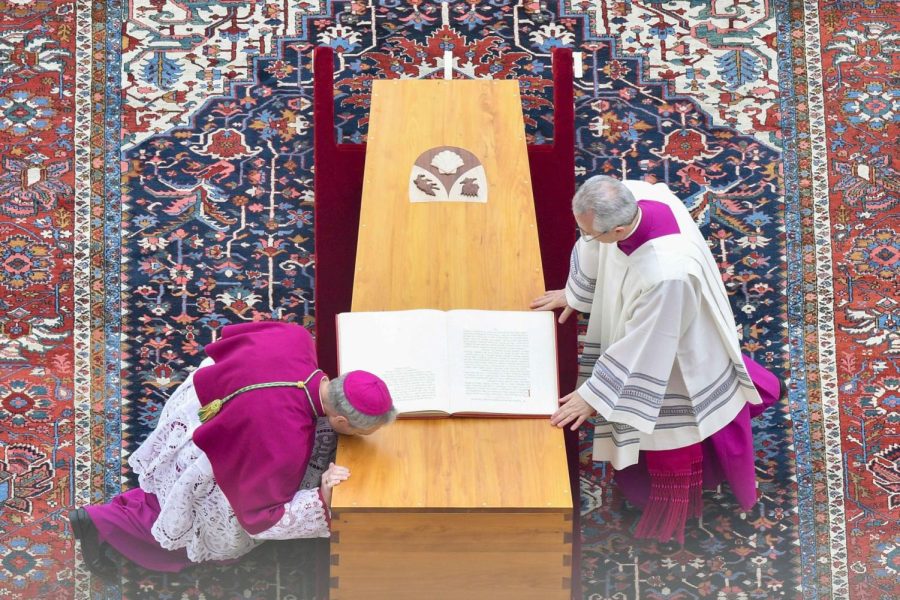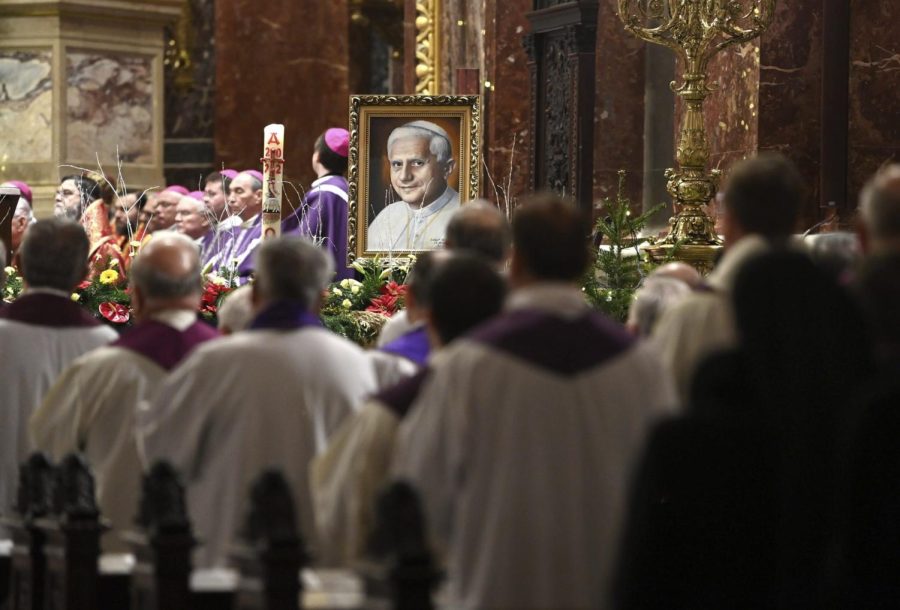Catholic community reflects on controversial Pope Benedict
Credit: Noemi Bruzak | MTI via AP
Roman Catholics around the world mourn the death of former Pope Emeritus Benedict XVI following his death on Dec. 31, 2022.
“God’s Rottweiler,” “The Enforcer,” “Cardinal No and The Hammer.” Former Pope Emeritus Benedict XVI, who died on Saturday Dec. 31 at age 95, both embodied and contradicted the connotations of these nicknames through his traditional conservatism and his leadership of a Church to the pursuit of truth.
“Living in Italy and having Rome so close, I remember going to Rome and St. Peter’s Square to see him talk,” said Tommaso Vato, communications coordinator for DePaul’s Campus Ministry. “He was always portrayed as a very, very intelligent person that has studied a lot and that really put God first in anything.”
According to the Vatican’s biography of him, the former pope, whose original name was Joseph Ratzinger, was born in Germany on April 16, 1927 to a traditional family of Catholic farmers.
Growing up under the strict Nazi regime, Ratzinger was conscious of the animosity that existed in Germany towards the Catholic Church and recalled seeing his priest being beaten by Nazis before mass. It was under this upbringing that Ratzinger “received his Christian, human and cultural formation,” writes the biography.
According to the biography, Ratzinger studied philosophy and theology at the University of Munich before climbing through the ranks of the church from theology professor in 1957 to pope in 2005.

“I met the man who became Pope Benedict as Cardinal Ratzinger when I was doing my ministry in Colombia,” said Fr. Memo Campuzano, C.M., Vice President of DePaul’s Mission and Ministry Division, in an email interview. “We were afraid when we heard his name. He was attentive to identify anything that in his view would contradict the traditional teachings of the Church.”
According to Campuzano, the former pope “acted with a heavy hand,” punishing theologians and prohibited the publication of books and teachings that he did not see in alignment with the church.
While remaining a strict guardian of Roman Catholic theology, the former pope attended all four sessions of the Second Vatican Council which had one heavy task: adapting the traditional Catholic Church to the rapidly modernizing world it found itself in without losing its integrity.
“He witnessed the most important theological discussions of the church in the past 60 years,” Campuzano said. “He was actively involved in those conversations with his own vision, his own theology and understanding of things.”
His own vision combined scripture with solutions to one of the most serious obstacles facing the 21st century: a lack of truth.
Some of his most notable pursuits of truth include initiating discourse in the Catholic Church about putting an end to sexual abuse, introducing the topic of climate change, and even pursuing his own truth with his resignation in 2013 from the papacy.
Although the former pope made strides to end abuse, several cases did go unnoticed and unpunished under his watch.
According to a statement from Martin Pusch, the attorney of the law firm Westphal Spilker Wastl that was hired by the church to investigate the abuse, Pope Benedict was accused of failing to act on four cases of sexual abuse.
“He pushed the bishops to take action against abusing priests… he did not take action against bishops who did not remove bishops,” William Cavanaugh, DePaul professor of Catholicism and Director of the Center for World Catholicism and Intercultural Theology said in a Zoom interview.
Although Cavanaugh recognizes the lack of mechanism there was for removing abusers, he highlights that Pope Benedict did more than popes prior.
“When he became pope, he took more action against sexual abusers than anybody had previously,” Cavanaugh said.
According to Cavanaugh, the former pope was also known as “The Green Pope” for his emphasis on ecology and was even the first to put solar panels on the Vatican.
“He didn’t just talk about it, he did it.” Cavanaugh said.
The former pope not only pursued truth within the church and within the world, but also within himself when in 2013 he resigned. In his resignation address given on Feb. 11, 2013 on the World Day of the Sick, a Vatican holy day, he stated that due to his age and declining health, he was no longer suited to continue.
It was a complete shock to the world and only over done by four popes in the history of the papacy, the last being Pope Gregory XII in 1415.
“On that day, he opened the door, after 600 years, for the Catholic Church to see the transitory nature of all human leadership,” Campuzano said. “I respect him very much for his resignation from the papacy and for giving space to another vision for the church.”
For the DePaul community, the pursuit of truth is not only applicable to the church however, but also as part of an academic institution.
“I think Pope Benedict was a voice for truth in the world and an advocate that we seek for what’s true and not just for what is convenient or what lines up with our own ideology,” Cavanaugh said. “That doesn’t mean that we need to agree with every stance he took, but for a university to take the pursuit of truth seriously, is something I think Benedict was a tireless advocate for.”
DePaul is the largest Catholic university in the U.S. in terms of enrollment with over 14,000 undergraduate students, yet being in the third-largest city in the country takes on a unique approach to what being Catholic means.
“[Truth] is something that the university should remember because as a Catholic institution, we bring along a Vincentian tradition and help for the other, but also a very long-lasting tradition of academic excellence.” Vato said. “I think that Pope Benedict shows that these two things can go together hand in hand.







